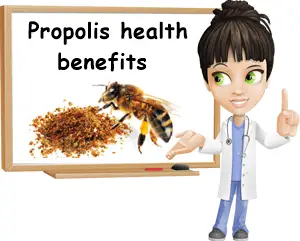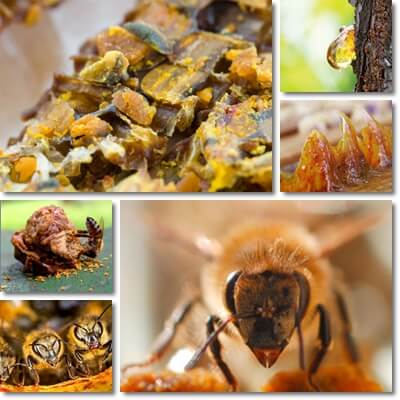Propolis is a honey bee product made from tree resin or sap, beeswax and bee saliva and used as sealing material for the hive to close off openings. Propolis has medicinal value as well and has been used for its curative properties in traditional medicines around the world. The therapeutic value of bee propolis includes a strong antibacterial, antifungal, anti-inflammatory and antioxidant action, anti-ulcer and other skin benefits, antitumor activity, hepatoprotective benefits, strong immune system-boosting action and potential benefits for diabetes disease.
What is propolis? Propolis is also called bee propolis or bee glue and is a natural adhesive produced and used by honey bee species to close off any openings in their hive and protect their colony, offspring and food reserves from humidity, molds, bacteria, parasites or intruders like small rodents or reptiles. Propolis is made of tree resins or sap, sometimes insect resins, beeswax and honey bee saliva, all mixed together in specific amounts.

Resins are sticky, glue-like, strong-adhesive, viscous or solid substances produced by various tree species. Examples of tree resins include amber, copal, balsams, mucilage or saps. Trees exude these resinous materials to seal off injured areas from molds, bacteria, parasitic insects and other opportunistic microorganisms or herbivores. Honey bees often collect resins from pine trees, poplars and several other species, but almost any resinous material will do, even that from mirabelle trees, plum trees or willows. It has been speculated that it is actually the tree resin that accounts for the antibacterial, antifungal and anti-parasitic properties of propolis.
Just as interesting, the color of the resin used often dictates the color of propolis. In addition to tree resins, honey bees may also collect resins produced by various insect species. Beeswax is produced by honey bees and is used to make honeycombs for storage purposes. Just like the plant and insect resins, it too is a natural product. By mixing the wax with their saliva and resins collected from various woody plants or insects, honey bees produce this strong, natural adhesive called propolis.
What does propolis contain?
Propolis is a unique product with a varying chemical composition and therapeutic action. Unlike honey, royal jelly or pollen, it does not have any nutritional value for honey bees. However, it is vital for the protection of the hive and colony against intruders, bacteria, fungi or parasites, but also humidity, all of which can affect not only honey production, but also colony health. As far as its composition is concerned, propolis generally contains 50% resins, 30% wax materials, 10% essential oils, 5% pollen and 5% other biologically active constituents (Propolis: A Wonder Bees Product and Its Pharmacological Potentials). Antioxidants such as kaempferol or caffeic acid, flavonoids and phenolic acids, vitamins and dietary minerals have also been identified.

What does propolis look like? Because plant resins are such a big part of its composition, the color of propolis depends primarily on the color of the resins it contains. Most often, propolis is dark brown-colored, but can be different shades of amber, especially medium or dark amber, even black, or come in shades of red, green, yellow or white. Consistency may also vary. The bee product has a more viscous, glue-like consistency at room temperature and higher temperatures. At lower temperatures, it is solid and likely to break easily.
What does propolis taste and smell like? The bee product has a strong, bitter, medicinal and overall unpleasant taste on its own. It’s slightly resinous, with faint herbal, woody notes. Depending on the origin of the resins collected by honey bees, other flavor notes may be present, but are nonetheless weak. It has no particular smell, except maybe for a weak woody aroma and a resinous scent.
How to use propolis
Both the softer, sticky and the hard propolis can be consumed. The bee product is available in capsule form for those who cannot stand its taste, but also as tinctures or extracts. Raw propolis is also available, but because of its taste, many people just grind it into a fine powder and swallow it to avoid chewing. Fortunately, you can mask the taste of propolis by mixing it with honey, adding it to a fruit juice or shake or eating it with jam, jelly, marmalade, anything that works for you. I am even thinking of having propolis with milk or with effervescent vitamin C, although the honey combination is my favorite.
What are the health benefits of propolis?
Bee propolis boasts a wide range of therapeutic benefits, exerting strong antibacterial, antioxidant, anti-ulcer and other wonderful properties with visible curative effects. Read more about these 8 exciting properties, uses and health benefits of bee propolis:
1) Natural bactericidal and antifungal. Propolis ethanol extracts have been shown to successfully inhibit the growth of Gram-positive bacteria such as Staphylococcus aureus, Streptococcus pyogenes, Enterococcus and others. Moreover, the bee product has shown an impressive antifungal activity against several strains of Candida. Its excellent antibacterial and antifungal properties are believed to be a result of its antioxidant content. Propolis appears to be effective for the treatment of wounds, skin ulcers, canker sores (mouth ulcers), cold sores, certain Candida infections of the mouth (causing white tongue and bad breath) and various respiratory tract infections.
2) Strong anti-inflammatory action. The antioxidants, volatile oils, pollen constituents and other elements in propolis all possess strong anti-inflammatory properties, accounting for the anti-inflammatory action of the bee product. Propolis has been shown to inhibit the inflammatory responses of cytokines (elements of the immune system), nitric oxide production, histamine release and modulate other immune system elements and mechanisms, resulting in decreased inflammation levels in the body. Animals studies show that the best results are obtained by low doses of propolis over longer periods of time and that the bee product shows great promise in easing inflammation and pain for rheumatoid arthritis sufferers (Use of Propolis in Cancer Research).
3) Clears throat infections. Propolis is an amazing natural remedy for throat infections. It can help reduce symptoms and clear the infection faster in cases of streptococcal pharyngitis (strep throat), pharyngitis, tonsillitis, the common cold etc. A few years back I suffered from strep throat and experienced fever, sore throat, swollen lymph nodes, lost my appetite and could barely get out of bed. Luckily, I received a honey with green propolis and ate two teaspoons right away in hopes it could ease my throat pain.
After a few hours, my throat was feeling a lot better, so I continued to take two tablespoons of the propolis and honey every 4 hours. In two days I was feeling like my normal self and the white spots on the back of my throat and on my tonsils disappeared completely in less than four days, so I had no need for antibiotics given the fast recovery I experienced. It was amazing what the propolis and honey did for my throat infection.
4) Excellent immune system booster. Propolis has an immunomodulating action, meaning it stimulates the immune system to improve its response against infection and disease, hence its effectiveness in treating bacterial and fungal infections, reducing inflammation and pain and exerting an anticancer activity. More exactly, studies show the bee product activates macrophages, stimulates the production of antibodies, supports the activity of natural killer cells and enhances the overall response of the immune system, particularly cell-mediated and humoural immunity (Immunomodulatory action of propolis: IV. Prophylactic activity against Gram-negative infections and adjuvant effect of the water-soluble derivative).
5) Proven antioxidant and antitumor activity. By activating, supporting and enhancing the activity of cells, proteins, antibodies and other elements of the immune system, propolis exhibits anticancer effects. Studies show it supports the activity of natural killer cells, white blood cells that hunt down cancer cells and boosts the production of antibodies. Moreover, the wide range of antioxidant constituents in the bee product protect cells from oxidative stress and subsequent cell damage that may cause them to turn cancerous. Studies show they also have an antiproliferative action and are toxic for certain types of cancer cells (colon, melanoma, liver, lung, pancreas etc.), inducing apoptosis or programmed cell death in cancer cells.
6) Good for dental cavities. The antioxidants in propolis have been found to inhibit the growth of certain bacteria known to cause dental cavities and tooth decay, notably Streptococcus mutans, Streptococcus sobrinus, Peptostreptococcus anaerobius, Peptostreptococcus micros, Lactobacillus acidophilus etc. Apigenin, quercetin, kaempferol, caffeic acid, naringenin and other antioxidants are responsible for the beneficial effects of propolis in the prevention and possible management and treatment of dental cavities (In vitro antimicrobial activity of propolis samples from different geographical origins against certain oral pathogens).
7) Beneficial for liver and kidney health. Animal studies show the antioxidants in propolis protect liver and kidney cells against damage, indicating the kidney and hepatoprotective action of the bee product. Also, propolis has been noted to exert an anticancer activity against certain types of liver cancer cells.
8) Potentially good for diabetes. Animal studies show propolis extracts have the potential to reduce blood sugar levels, prevent weight loss, lower blood cholesterol levels and reduce oxidative stress in the liver and kidneys, managing the condition and preventing kidney damage associated with it (Experimental diabetic nephropathy can be prevented by propolis: effect on metabolic disturbances and renal oxidative parameters).
Conclusion
Propolis is one of the healthiest bee products with a potent and varied therapeutic action. It is a natural product with a remarkable medicinal value, notably strong antioxidant properties, anti-inflammatory and antitumor action, antibacterial and antifungal activity, hepatoprotective effect as well as skin benefits. However, its chemical composition and properties may differ greatly depending on the region where it is produced. Also, because it is made by honey bees, it should be avoided by those allergic to the honey bees, honey and other bee products.
